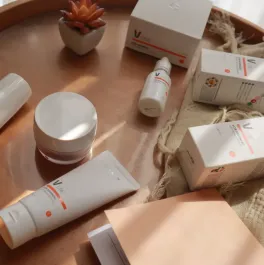We're Careful About Our Ingredients
Use our products with absolute peace of mind, knowing that you’ll never find any of these chemical nasties in our products.
By Skin Concern
By Line
Sets & Devices
Use our products with absolute peace of mind, knowing that you’ll never find any of these chemical nasties in our products.
Phenoxyethanol
Triggers skin irritation
PABA
Causes allergic dermatitis and photosensitivity
Parabens
Potentially carcinogenic hormone disruptors
Paraffin
May clog pores and cause breakouts
Sulfates
Dries out the skin and causes irritation
Synthetic Fragrances
Potentially dangerous ingredient-loophole
Phthalates
Causes reproductive, developmental and other health issues
Petrolatum
Carcinogenic if potentially contaminated
DEA
Reacts with other ingredients to form a carcinogen
Triclosan
May harm the immune system
Mineral Oil
May clog pores and cause breakouts
Propylene Glycol
Common allergen that may cause rashes
Phenoxyethanol is a preservative commonly used in cosmetics and personal care products and is included in certain fragrances. It tends to trigger hives and skin irritation in sensitive individuals.
PABA and PABA derivatives are sometimes used in sunscreens as UVB filters. It is less commonly used today as its use has been banned in several countries but many products still contain PABA derivatives. PABA may alter thyroid activity and it remains unclear if there are negative effects on long term health. It also has a tendency to cause allergic dermatitis and photosensitivity.
Parabens are a group of chemicals used as artificial preservatives in cosmetic and body care products to help prevent the growth of harmful bacteria and prolong the shelf life of such products. Research has shown that parabens, when found in sufficient amounts, are potentially carcinogenic, can disrupt hormones in the body and also harm the male and female reproductive systems. Although the amount of parabens in a single product is typically small, it is daily use of multiple products containing parabens that leads to continuous and potentially dangerous exposure. Parabens accumulate in the body over time in fat tissues and have been detected in infants, adults and even pregnant women.
Typically distilled from petroleum, paraffin is a type of mineral oil. It is a popular ingredient in many face creams and body lotions since it is a cheap ingredient with skin moisturising properties. However, research has shown that liquid paraffin merely provides a soft, silky afterfeel when applied but does not actually improve your skin’s moisture content. It does however, create a barrier on your skin which prevents moisture loss. This barrier it creates may clog pores and trap other comedogenic ingredients into the skin, and those can cause breakouts.
Sulfates (SLS and SLES) are most commonly found in personal products and cleaning agents as they act on the skin and hair surface to remove dirt and sebum. They are usually the ingredients responsible for the soapy lather in your cleaning products. Sulfates can cause varying levels of irritation to your eyes, skin, mouth and lungs, which gets worse the longer the product is in contact with your skin. This means your skin may tolerate a body wash with SLS better than a facial wash that tends to stay on the skin longer. Sulfates also dry out your skin, and lead to the formation of acne.
Fragrance, or parfum is the only “ingredient” typically comprising a combination of chemicals that legally do not have to be individually declared on an ingredients list. This is because fragrances are protected as a trade secret. Synthetic fragrances commonly include harsh toxins like benzene derivatives, aldehydes, toluene and phthalates. Used in most beauty products, they are also much cheaper than natural scents and essential oils. Artificial fragrances may cause skin irritation, allergies, asthma, eczema, hives, and contact dermatitis. They have also been linked to cancer, birth defects, nervous system disorders and other conditions.
Phthalates are used as lubricants and are often a hidden ingredient in synthetic fragrances. They are known to be endocrine disruptors that are linked to breast cancer and reproductive birth defects in males and females. They may also increase the risk of a miscarriage. Exposure to phthalates is widespread and a study found they are present in the majority of the population. Its use has been banned in many countries but some forms of phthalates are still able to slip through regulations
When properly refined, petrolatum has no known health concerns. It is often used in personal care products as a moisturising agent. However, petrolatum may not always be fully refined, and may be potentially contaminated with toxic chemicals called polycyclic aromatic hydrocarbons (PAHs). There is no way to confirm if petrolatum has been fully refined unless a complete refining history is provided. PAHs are known carcinogens and may contribute to cancer development.
DEA compounds are used to make cosmetics creamy or soapy. It is mainly found in moisturisers and sunscreens and is not harmful on its own. However, over time, it reacts with other ingredients in cosmetics formulations and forms nitrosodiethanolamine (NDEA), a powerful carcinogen that is absorbed through the skin. In fact, prolonged exposure has been shown to cause liver cancers and pre-cancerous changes in skin and thyroids. DEA compounds may also cause mild to moderate skin and eye irritation.
Triclosan is added to many products to reduce or prevent bacterial contamination. It can be found in some antibacterial cleansers, body washes and toothpastes. When you use a product with triclosan, it is absorbed into your body through your skin. It has been banned in several countries as it has not been proven to be safe for daily use over a long period of time. Ongoing studies suggest it may alter hormone regulation, contribute to the development of antibiotic-resistant bacteria and may also be harmful to the immune system.
Mineral oil is a popular ingredient in many face creams and body lotions since it is a cheap ingredient with skin moisturising properties. However, research has shown that mineral oil merely provides a soft, silky afterfeel when applied but does not actually improve your skin’s moisture content. It does however, create a barrier on your skin which prevents moisture loss. This barrier it creates may clog pores and trap other comedogenic ingredients into the skin, and those can cause breakouts.
Propylene glycol is usually used as a humectant and preservative in skincare products. It is not unsafe to use but is a common allergen that may cause rash and worsen eczema. It is also not suitable for those with sensitive skin.
Phenoxyethanol is a preservative commonly used in cosmetics and personal care products and is included in certain fragrances. It tends to trigger hives and skin irritation in sensitive individuals.
PABA and PABA derivatives are sometimes used in sunscreens as UVB filters. It is less commonly used today as its use has been banned in several countries but many products still contain PABA derivatives. PABA may alter thyroid activity and it remains unclear if there are negative effects on long term health. It also has a tendency to cause allergic dermatitis and photosensitivity.
Parabens are a group of chemicals used as artificial preservatives in cosmetic and body care products to help prevent the growth of harmful bacteria and prolong the shelf life of such products. Research has shown that parabens, when found in sufficient amounts, are potentially carcinogenic, can disrupt hormones in the body and also harm the male and female reproductive systems. Although the amount of parabens in a single product is typically small, it is daily use of multiple products containing parabens that leads to continuous and potentially dangerous exposure. Parabens accumulate in the body over time in fat tissues and have been detected in infants, adults and even pregnant women.
Typically distilled from petroleum, paraffin is a type of mineral oil. It is a popular ingredient in many face creams and body lotions since it is a cheap ingredient with skin moisturising properties. However, research has shown that liquid paraffin merely provides a soft, silky afterfeel when applied but does not actually improve your skin’s moisture content. It does however, create a barrier on your skin which prevents moisture loss. This barrier it creates may clog pores and trap other comedogenic ingredients into the skin, and those can cause breakouts.
Sulfates (SLS and SLES) are most commonly found in personal products and cleaning agents as they act on the skin and hair surface to remove dirt and sebum. They are usually the ingredients responsible for the soapy lather in your cleaning products. Sulfates can cause varying levels of irritation to your eyes, skin, mouth and lungs, which gets worse the longer the product is in contact with your skin. This means your skin may tolerate a body wash with SLS better than a facial wash that tends to stay on the skin longer. Sulfates also dry out your skin, and lead to the formation of acne.
Fragrance, or parfum is the only “ingredient” typically comprising a combination of chemicals that legally do not have to be individually declared on an ingredients list. This is because fragrances are protected as a trade secret. Synthetic fragrances commonly include harsh toxins like benzene derivatives, aldehydes, toluene and phthalates. Used in most beauty products, they are also much cheaper than natural scents and essential oils. Artificial fragrances may cause skin irritation, allergies, asthma, eczema, hives, and contact dermatitis. They have also been linked to cancer, birth defects, nervous system disorders and other conditions.
Phthalates are used as lubricants and are often a hidden ingredient in synthetic fragrances. They are known to be endocrine disruptors that are linked to breast cancer and reproductive birth defects in males and females. They may also increase the risk of a miscarriage. Exposure to phthalates is widespread and a study found they are present in the majority of the population. Its use has been banned in many countries but some forms of phthalates are still able to slip through regulations
When properly refined, petrolatum has no known health concerns. It is often used in personal care products as a moisturising agent. However, petrolatum may not always be fully refined, and may be potentially contaminated with toxic chemicals called polycyclic aromatic hydrocarbons (PAHs). There is no way to confirm if petrolatum has been fully refined unless a complete refining history is provided. PAHs are known carcinogens and may contribute to cancer development.
DEA compounds are used to make cosmetics creamy or soapy. It is mainly found in moisturisers and sunscreens and is not harmful on its own. However, over time, it reacts with other ingredients in cosmetics formulations and forms nitrosodiethanolamine (NDEA), a powerful carcinogen that is absorbed through the skin. In fact, prolonged exposure has been shown to cause liver cancers and pre-cancerous changes in skin and thyroids. DEA compounds may also cause mild to moderate skin and eye irritation.
Triclosan is added to many products to reduce or prevent bacterial contamination. It can be found in some antibacterial cleansers, body washes and toothpastes. When you use a product with triclosan, it is absorbed into your body through your skin. It has been banned in several countries as it has not been proven to be safe for daily use over a long period of time. Ongoing studies suggest it may alter hormone regulation, contribute to the development of antibiotic-resistant bacteria and may also be harmful to the immune system.
Mineral oil is a popular ingredient in many face creams and body lotions since it is a cheap ingredient with skin moisturising properties. However, research has shown that mineral oil merely provides a soft, silky afterfeel when applied but does not actually improve your skin’s moisture content. It does however, create a barrier on your skin which prevents moisture loss. This barrier it creates may clog pores and trap other comedogenic ingredients into the skin, and those can cause breakouts.
Propylene glycol is usually used as a humectant and preservative in skincare products. It is not unsafe to use but is a common allergen that may cause rash and worsen eczema. It is also not suitable for those with sensitive skin.
When we began formulating our products, we provided our team of scientists with a long list of chemical nasties which we knew we would never allow in any of our products. These ingredients are commonly found in most skincare and beauty products and it was no mean feat to exclude them from our products. In the words of our chief scientist, “… formulating BSKIN gave us the opportunity to push the limits of skincare and ingredient technology.”



